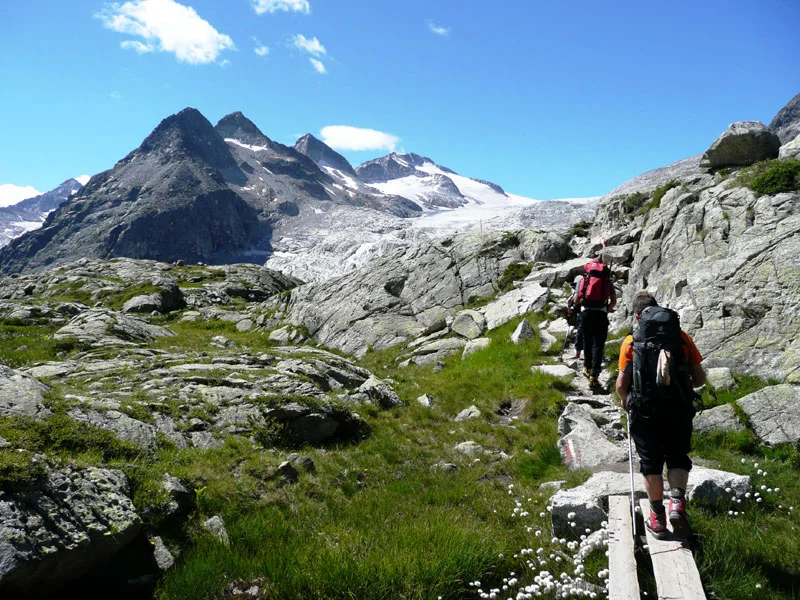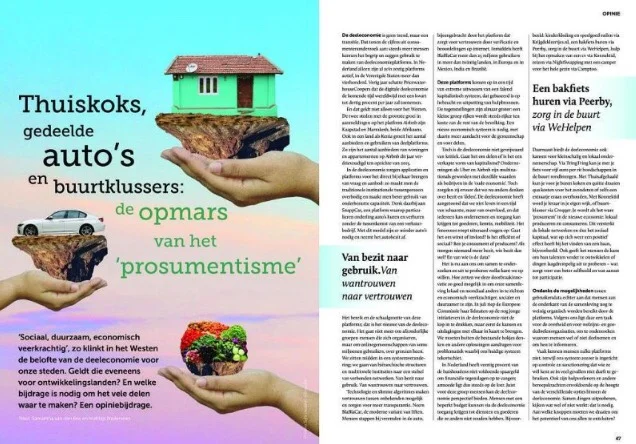On April 3rd 2017, the 82-years old Luud Schimmelpennink received the ‘Frans Banninck Cocq’ medal from the alderman of transportation in Amsterdam, Pieter Litjens. This medal is for people who have made a merit for the city over a period of 10 years or more. Luud is the inventor of the ‘Witkar’ and the ‘Witte fietsenplan’ back in 1967, and can be seen as the godfather of car- and bikesharing.
Read MoreThis holiday I wanted to try camping with my family. We considered a caravan, a tent and a camper. Because we do not own a car, we would have had to rent a car ánd a caravan. As it was still quite cold, the camper won over a tent. I started searching on some different platforms like SnappCar, GoBoony and Camptoo - all peer-to-peer rental platforms. I like the idea of going on holiday with a privately owned camper. It's a more personal experience than renting an anonymous camper somewhere. Interestingly I met some campers over and over again on every platform. I picked Camptoo, as they had the most choice in offering in the area.
Read MoreA sharing city embraces and monitors the collaborative economy as a means to a more socially, sustainably and economically resilient city. Lately, Amsterdam has received a lot of attention for being a front-runner in monitoring, rather than banning, the sharing and collaborative economy in the city.[1][2][3][4][5][6] Very often, the collaborative and sharing economy is equaled exclusively to Airbnb and Uber, which are portrayed as very problematic for the city and its people. Every story has two sides, and although there are, and will be, challenges with any initiatives, there are also benefits and opportunities. Moreover, the collaborative economy has a much richer ecosystem beyond the typical examples of Uber and Airbnb. These two giants are making up a big part of the discussion, but surely, our scope has to be widened to include other platforms such as for example WeHelpen, Konnektid and Thuisafgehaald (Share your meal).
Read MoreJust around the corner, in the heart of Amsterdam, there’s a house high mural painting stating ‘Ik speel in de stad met alles wat er bestaat’, in other words ‘I play in the city with everything there is.’ It actually is a quote by a young boy from a school nearby. For me, this motto is the metaphor of a true ‘sharing city.’ Let’s face it: all we need is already there, right at your doorstep. Look around in your own neighborhood, in your own community. From a helping hand to someone who can cook a meal for you; from a ladder you can borrow from a neighbor to a car when you want to leave town. Sometimes really the only thing you have to do is ask. And share.
Read MoreIn this month's insights, you can read about:
- Europe's collaborative economy in 2030
- Interview with Harmen van Sprang and Pieter van de Glind in Reinvent
- How to ensure that everyone has access to mobility, with less automobility
- Why parking needs more attention
- Webinar about how the blockchain impacts the sharing economy and the world
And much more...
Read More“Exciting turn ahead” it must say on a traffic sign for those exploring the possible routes to the future of transportation. Technology is about to bring more opportunities for the way we move around than we had in the last century. Since the transition from horse carriages to the automobile changes have been evolutions, but no revolutions.
Now we are at the verge of a true revolution in transportation. Electrification has been slowly entering the market. Where public transport companies have been using electricity for a while, nearly all car manufacturers are now following. Tesla took it from ‘the good alternative’ to ‘the sexy alternative’ to a fossil fuel driven car.
Read MoreIn this month's insights, you can read about:
- The Re-shaping Work Conference 2017
- What we can learn from 50 years carsharing
- ShareNL in Forbes, Apolitical, The Huffington Post, and Inverse
- The introduction of startup Honeycombhousing
- The Italian Ecosystem
And much more...
Read MoreHoneycombhousing is a social/cultural-housing platform to connect international students with homeowners on peer-to-peer basis in Sweden. Sanne Toonen (founder of Honeycombhousing) explained: 'It’s the social aspect that makes the difference. It’s best described as 'Fika'. The Swedish expression for coffee breaks that’s more about socializing than drinking coffee. This Swedish tradition shaped Honeycombhousing to what it is today and sets them apart from other services in providing housing for international students.'
Read MoreThroughout the past several years, we began to share more personal belongings online; it started with music, stories and pictures on social media. Additionally, we started to exchange more and more items through sites such as Marktplaats. The emergence of the sharing economy affects a growing number of economic sectors today; we share our houses on Airbnb, tools on Peerby, energy on Vandebron or Powerpeers, knowledge on Konnektid, food on Thuisafgehaald, rides on Blablacar, and cars and parking spaces on platforms such as Snappcar, MyWheels and Mobypark. With these platforms, the Dutch gain access to each other’s belongings and services. In the Netherlands, one in five people use online sharing platforms (including Airbnb and Marktplaats.nl). However, sharing is not a new phenomenon, as people used to share their belongings long before the emergence of the sharing economy. Nowadays, we do not merely share our belongings with friends, family or other relatives but also with people we have never met. Research has shown that the percentage of Dutch people who are willing to share their belongings with strangers has grown from 10% to over 30% in the last 3 years. Read more...
Read MoreIn this month's insights, you can read about:
- The launch of shareBE.
- Sharing Economy and Sustainable Tourism.
- The European Mobility Week kick off.
- Why people actually participate in the collaborative economy.
- The Green Deal day.
- Regulatory framework for the sharing economy.
- The Amsterdam Sharing City International Press trip.
And much more...
Read MoreAbout 150 people from all European countries are slowly trickling in around a big table, richly filled with colorful lunch options. Some have driven hours at night to catch a plane from their capital; others were a short train ride or even bike ride away. The diversity and mix of languages and cultures immediately creates a good vibe and lots of energy in the room.
Read MoreSustainability is often a reason for cities to consider becoming a sharing city. But what about sharing regions? During a morning in Trento I engaged with Trentino’s (Italy) tourism industry to explore the opportunities the collaborative (& sharing) economy for sustainable tourism in the region. Here are my main take-aways.
Read MoreThis edition of the shareNL insights tells you about the blockchain and the collaborative economy; the future of work and time; why tourists choose Airbnb; the sharing economy in disadvantaged communities; collaborative platforms and the labour force; what our youngsters can share'; sharing in Antwerp's creative & cultural sector; and much more...
- And check out where we will be in the next few days - busy month of March!
This meetup was a deep-dive into the future of the (collaborative) economy, and the future of society. While shareNL has been involved in the sharing/collaborative economy for quite some time now, the blockchain was a relatively new topic. With the aim of reshaping society, it was time to address the potential role of blockchain platform services in the current society. To answer the question of whether the blockchain will live up to its promise to enable a true peer-to-peer network, Pieter van den Glind (shareNL), Samantha van der Bos (shareNL), Perry Smit (Innovationlab of the Chamber of Commerce), Chris Huls (Rabobank), Jeroen Rijnbout (BITONIC), and Robert-Reinder Nederhoed (blandlord.com) provided us with insights into the possibilities of blockchain technology.
Read More“All the modern technologies have only let us work more, and work harder.” This is a popular statement these days, but they do not fit well with the actual numbers. Tools and machines have made us faster and stronger. Digital technologies have made us smarter and have let us communicate faster. Over time, technologies have dramatically increased our productivity. Today, we get more done in less time. Our output has increased both at the workplace and in the household.
Read MoreSharing the Sharing City experience newsletter including: the potential of car sharing; a car sharing solution for small countryside villages; the real (e)state of the sharing economy; what is needed to become a true sharing society; the 'peer-to-business-to-peer' marketplace; and much more...
Read More‘Social, sustainable and economically resilient’, that’s the promise of the sharing economy for our cities in the West. Is this also the case in developing countries? And what is needed to become a true sharing society? An opinion column.
Read MoreThe real (e)state of the sharing economy.
Why do streets look the way the look? Why buildings are designed they way they do? And how are cities shaped? Everything evolves around space. Space needed to live, work, meet, relax ánd to move around. That space to move has been increasing rapidly since the introduction of the automobile. Roads and parking places do not only use a large part of public space as well as private space and budget. Quite an inefficiently organised mobility system. Read more about the trend in re:shaping mobility in the early design and building phases of a city.
With non-profit organizations rethinking their strategies, local development programs and their own role in a changing world, Matthijs Nederveen and Samantha van den Bos believe the sharing economy is a topic, or a tool worth exploring. That's what we did on the 2nd of February. We came together and explored the current state, the development, opportunities and challenges of the collaborative economy in the global south at our shareNL home, in collaboration with The Spindle. And we did more than talking. Some good ideas were presented, and will be further developed. Read the full report by Elena Presas Batlló. (thank you!)
Read More





![Sharing Economy in Amsterdam [NEW VIDEO]](https://images.squarespace-cdn.com/content/v1/54ba147de4b04c160a2f6dcc/1494620764647-5IW691XJGCSLDMFCVK4X/Sharing+Economy+in+Amsterdam+%5BVIDEO%5D.jpg)














